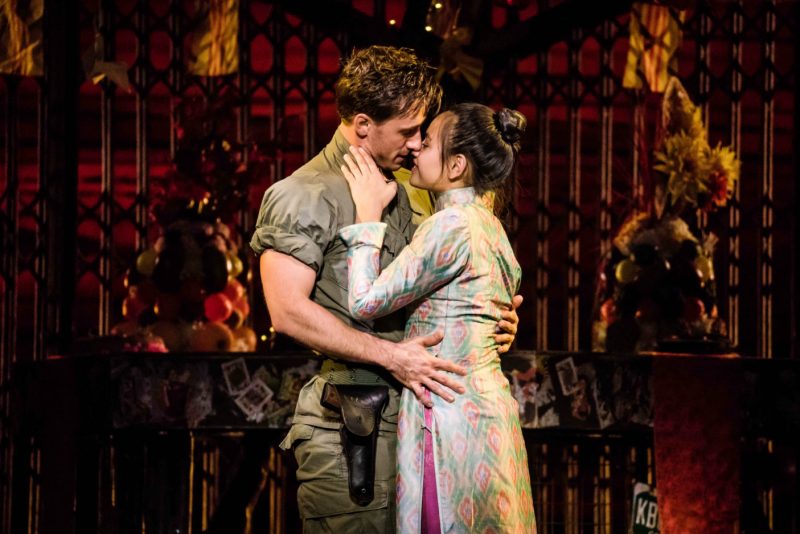
Miss Saigon by Claude-Michel Schönberg, Alain Boublil, and Richard Maltby Jr. Directed by Laurence Connor. Broadway Philadelphia through March 31, 2019, at the Academy of Music, 240 S. Broad Street, Philadelphia.
*
A powerful production of Miss Saigon reaffirms my belief that this is the best musical storytelling by the team of Claude-Michel Schönberg and Alain Boublil. Since they also wrote Les Misérables, this should be understood as a high compliment.
Loosely based on Puccini’s Madame Butterfly, Miss Saigon is the tragedy of an Asian woman who falls in love with an American who then abandons her. Despite the fact that she’s the sympathetic center of the story, some critics call this show an affront to Asians. (“Melodramatic white-savior fantasia claptrap” wailed playwright Qui Nguyen in American Theatre magazine, ignoring the fact that the show employs dozens of Asian actors while it makes us sympathize with the Vietnamese.)
Miss Saigon expands upon, and improves on, its source material. I make this evaluation after enjoying performances of the opera for decades and, furthermore, the original playwright was a neighbor of mine. John Luther Long lived in Elkins Park, Pennsylvania, in a home overlooking the Little League field where my children played — long after his death, of course.
In the original, Pinkerton didn’t love Butterfly, and his abandonment was heartless. In this show, it’s the American evacuation from Saigon that separates the lovers. Pinkerton was a peacetime sailor looking for a diversion to relieve his boredom, while Chris is a draftee traumatized by years fighting a fruitless war. Interesting layers are added to the original version, criticizing the exploitation of women, the futility of the Vietnam War, and the obligation of society to the children of Asian women who were fathered by American military men.
America is not the good guy here. The biggest musical number actually is an indictment of American society. No one is a hero except the innocent Kim, who escaped the slaughter of her family, and the empires of Communist Viet Cong and materialistic America are culpable counterparts of each other. The personification of corruption is The Engineer — half Vietnamese, half French. He’s a pimp who “engineers” his own position from capitalist entrepreneur to Communist informant, selfishly angling for a visa to enter the USA.
Emily Bautista is the tragic Kim, with a voice equally effective in quiet moments and in belting emotionalism. Anthony Festa displays a ringing tenor voice as Chris. What’s more, he looks like an average guy rather than a movie star, making him believable as the stressed-out serviceman. J. Daughtry is excellent as the black soldier who returns home to lead a movement to help the multiracial children from Vietnam. His singing of “Bui-Doi” is a highlight: “They are the living reminder of all the good we failed to do.”
Another high spot is the evacuation of the last Americans from the embassy by helicopter while abandoned Vietnamese scream in despair. As staged by Laurence Connor and Adrian Vaux with dramatic lighting by Bruno Poet and sound by Mick Potter, this is almost as effective in this road production as the original was in 1991.
As The Engineer, Red Concepción is too exaggerated, lacking sympathetic engagement although he belts his big number, “The American Dream,” effectively. His diction is unclear, mushing up the incisive rhymes of Richard Maltby Jr. We must praise the literacy of Maltby’s work, far superior to the doggerel English lyrics in Les Misérables.
Stacie Bono is admirable as the woman who married Chris after the war — another instance where Miss Saigon fleshes out a character limned weakly in the opera.